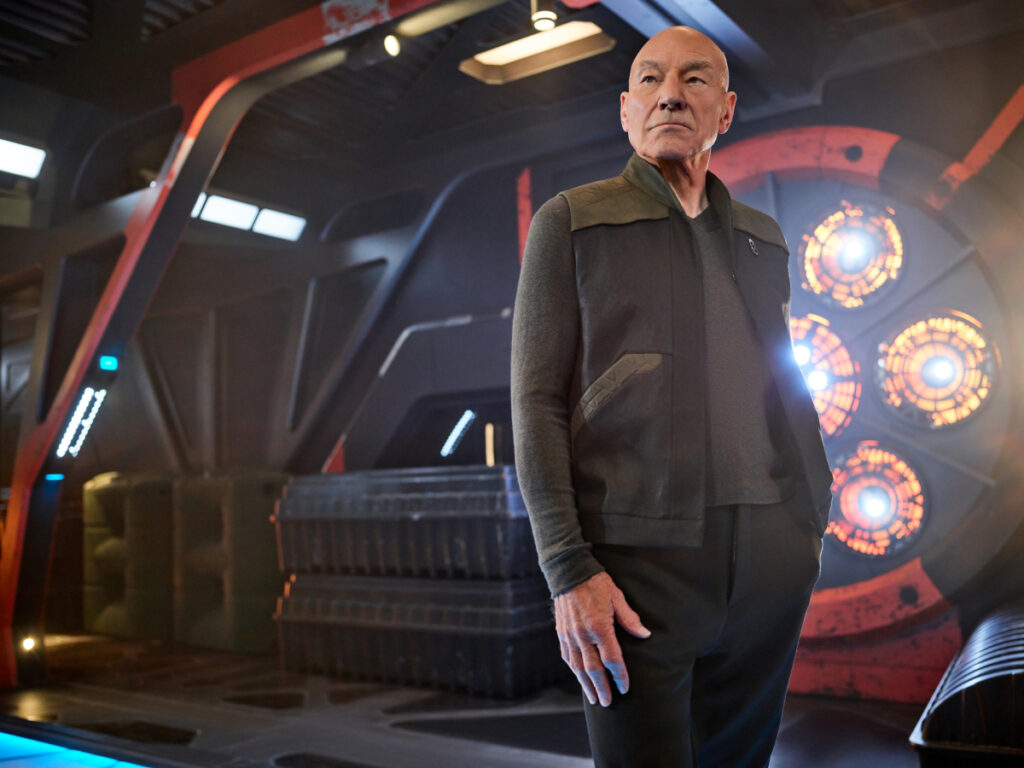There’s an immediate thrill in seeing the great Patrick Stewart playing his most iconic character, Captain Jean-Luc Picard. In an era dominated by reboots and nostalgia, it makes sense that the current state of this legendary franchise would lead us to “Star Trek: Picard,” premiering today on CBS All Access. “Star Trek: The Next Generation” is an essential show for my development as a TV critic, a program I still love to revisit. And so when “Picard” opens with my favorite ST Captain (sorry, Kirk fans) sitting across from Data (Brent Spiner), my heart skipped a beat. I’m truly sad to say that it was back to its normal pace long before the end of the third episode.

Developed by the Pulitzer Prize-winning author Michael Chabon and Akiva Goldsman, “Star Trek: Picard” is a very talky, sometimes clunky return to the world of the legendary captain, with a few other familiar faces and plot threads from “TNG” along the way. It picks up with Picard retired on a vineyard in France. A reporter comes to interview Picard—one of the laziest tools for back story exposition imaginable—and we learn that Picard no longer has a good relationship with Starfleet. Roughly 15 years ago, something unimaginable happened—the synthetics revolted. Formerly loyal and reliable colleagues like Data turned so evil that it led to the destruction of Mars and its population. Of course, fans know that Data is dead, sacrificing himself at the end of “Star Trek: Nemesis,” the last fiction of this “ST” timeline. But his ghost and his importance as a friend and colleague haunts Picard.
I mean that literally. Picard is having dreams of his old friend, someone who he can’t believe would have ever turned Terminator on him. At the same time, a young woman (Isa Briones) is attacked, her boyfriend killed in the assault. She discovers, almost Jason Bourne-style, that she has very special skills, defeating her attackers. And she has visions of Picard that lead her to France, and get our hero sucked back into a very important mission, one that involves familiar allies and enemies, as well as a face of two that will give “TNG” fans that aforementioned heart-skip.
“The Next Generation” often embedded complex political and philosophical issues in its storytelling, and there are undeniably a few at play in the first three episodes of “Star Trek: Picard.” There’s an undercurrent of fate in how Picard gets drawn back into action, but there’s mostly a timeless one of sci-fi in which a leader’s principles don’t align with his perceived duties. Picard has become a rogue, unwilling to go along with a Starfleet administration that has painted all synthetics with the same brush and essentially deemed him a traitor. This means that “Picard” is now a show about a ragtag group of outsiders working off the grid, something much different than fans may be expecting. Of course, that’s not a bad thing, but the execution is clunkier and more exposition-heavy than it needed to be.
It feels like the character of Picard worked better in episodic storytelling than in season-long narratives, as even Stewart gets swept away in the plot-heavy first three episodes. He’s still good, but nearly every scene here is about what just happened or what needs to happen next. That’s fine for a narrative that’s going to get wrapped up with a sly Picard smile before the credits roll but becomes a drag over multiple episodes with no sense of closure at all. I ended up hoping for moments that I could linger in like that opening scene with an old friend—something that felt closed rather than just pushing to another scene or even another episode.
To be blunt, I don’t yet care about what’s happening in the timeline of “Picard,” and most of the goodwill I have toward this show is there because of my memories of “The Next Generation.” “Picard” has yet to step out of that shadow for me after three episodes, and the nostalgic charm has worn off. Now, here’s where a review of a show like this gets tricky—the first trio of episodes almost feel like a prologue to what “Picard” could or should be. So, of course, they’re going to feel more nostalgic. Without spoiling anything, the end of the third episode is like a major starting point for the series to really step into its own, and my hope is that “Picard” can still develop into something great. I’m not giving up on it. I just wish I could more wholeheartedly recommend the build-up and say I wasn’t at all concerned about where this ship is headed.
Three episodes screened for review.












